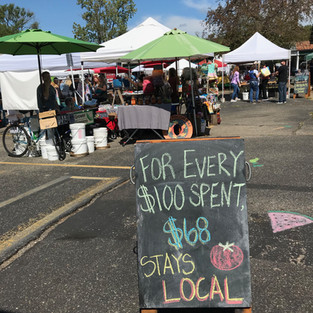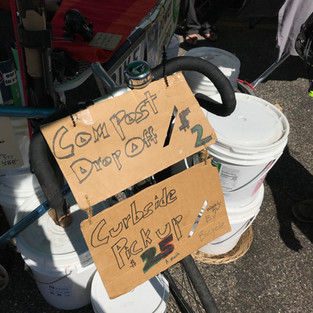7 ways to reduce environmental footprint through food
- morgan scoyne
- Nov 12, 2019
- 5 min read
Updated: Feb 17, 2020
Surprisingly, after a year and a half of covering various topics at CSNN, my favourite class was Eco-Nutrition for showcasing the intricate connections between our environment, our food industry and our health.
Looking back, it's not that surprising. My all-time favourite part of food and nutrition is that it is synergistic with other components of well-being and impact. If you improve your nutrition, chances are you boost your contribution to your family, your community and the world.
By eating better, you can do good in endless other ways, including reducing your carbon footprint. Here are 7 ways that you can create a better future through food:
1. Consider "food miles" when buying groceries
Chances are you've heard me mention this one or two (hundred) times before, but supporting local is sooo critical on both a smaller and larger scale. Think about it: the food you buy from your market, farm stand or local store means fewer "food miles" from the site of growing or production to your plate.
For example, I could buy spinach at the market from a farm 10 miles down the road and it might be a matter of hours between harvest and consumption, orrrr I could buy spinach at the grocery store that travelled hundreds of miles from the independent grower to the distribution facility, and thousands of miles from distribution site to the grocery store.
Buying local affects your individual health, your local economy and global pollution.
Tip: Visit your farmers market (usually on Saturdays) or farm stores (some open all week including Sundays). Sign-up for Community Supported Agriculture (CSA) boxes that often have scheduled pick-up or delivery, or look into businesses like The Sustainable Market that do local online grocery orders.
2. Eat more plants
Filling your plate with plants means reducing processed foods that use far more energy for production and far more unsustainable material for packaging. By focusing the bulk of your meal around plant foods instead of meats or packaged foods, your carbon footprint immediately plummets.
If meat is on your menu, like it is on mine, avoid the grocery store versions and instead ensure it comes from a local source (less food miles), and from a farmer who uses sustainable practices. Buying organic is another option to reduce chemicals, however there is some controversy. Read my blog about it here.
Tip: Remember to think about food miles. Buying strawberries in the dead of Canadian winter isn't totally congruent with reducing your carbon footprint. Eat with the seasons, and try local apples instead.
3. Question the practices
Your local grocery store employee likely won't know or care about the growing practices, but your local farmers will. If you're interested in buying from them, as you should be, ask some of the tough questions. Spend time gathering information about who they are as farmers, as business people and as humans, and then use it to purchase from your most trusted and aligned sources.
You vote with your dollar, over and over again. Choose wisely.
Tip: Passionate farmers like to connect and share their work. Make it your goal to ask at least one new question every time you're in company with anyone who knows more about food production than you.
4. Compost your scraps
Composting helps soil hold moisture leading to less water usage. Using your green bin increases beneficial microbes and healthy root structure in the soil, and reduces the need for commercial fertilizers. And, hey, based on experience, great relationships are born out of composting.
Keith gave me an extra compost bin way back in the early days (lol last year), and I used to drop it off every Thursday night when we lived across town as an excuse to chit chat. You could argue that it wasn't a good use of gas, but it also set me up to compost for the rest of my life - and over a year later, those 5 minutes ended up being a good relationship investment.
Did you know? KW has one of the best Green Bin programs. After being shipped to Guelph's Organic Waste processing facility, the finished compost is sold to regional farmers who add it to their fields to grow even more food. It's the gift that keeps on giving.
5. Bring reusable bags
By this time, we should be informed enough about single-use plastic, but yet we still don't do enough about it. Not only do plastic bags require the use of non-renewable resources during production, the final product, as we ought to know, isn't biodegradable and leaves our planet worse than how we found it.
On the flip side, purchasing endless dreusable bags that we don't use is likely even worse. Get in the habit of having them accessible for your grocery hauls.
Oh, and if you have purchased a couple, few or handful of items but forgot your bag, use your own dang hands to carry them. Fight through the minuscule amount of discomfort for the sake of something greater than yourself.
Tip: Consider putting your reusable bags in multiple locations so you're never left without. Think about your single-use plastics before road trips, and ensure you pack a travel kit of reusable containers, coffee cups, straws and cutlery.
6. Go bulk
Speaking of plastics, processed foods are often packaged in unsustainable materials, creating more waste sitting in our landfills. For the health foods that require some amount of processing, like baking ingredients or grains or tea, attempt to create a zero waste pantry by purchasing in bulk. Better yet, hit up businesses like Zero Waste Bulk who are incredibly passionate about reducing waste all along the distribution line - from producer to seller to consumer.
For beverage items, consider buying in one large amount versus many small ones. When it comes to beer, order draught over single bottles and cans.
Tip: There's no need to go out and purchase jars for a pantry. Reuse your glass containers from condiments like salsa, relish or local honey.
7. Return or reuse
What do you do with the egg cartons when none remain? What do you do with the pulp or plastic mesh tills when you've eaten all your seasonal strawberries, or the plastic hinge covers when you've finished your cherry tomatoes? What do you do with the bottles or jars when your product is done?
So much of what we immediately discard still has life left in it. Egg cartons can be used few more times, at least, and then elastics from your celery can still maintain function around the egg cartons when they get flimsy. Glass bottles can be used for on-th-go smoothies or DIY dressings.
If you don't use them, return what you can to a farmer or someone who can. This all goes a long way in reducing any need for 'brand new.'
Tip: 'Tis the season. Think about making local or homemade gifts for friends and family this year. Reduce amount spent on new, and utilize local products, or your creative power in repurposing various items.
Bring aware and adjusting your usage is not rocket science, but it's not necessarily easy either. It's a matter of being intentional, and making small changes in your daily routine. Maybe that means missing out on the tea if you don't have a reusable cup, bringing the glass bottle home with you if a building doesn't have recycling, or juggling your items out to the car if you didn't bring a bag.
Our habits got us to our current level of consumption, but we can also build new ones to get us, and this world, to a far better place.
Little by little.
























Comments